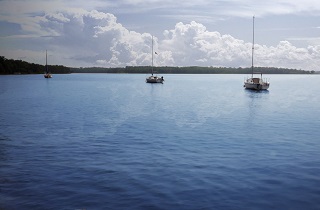Vincent Bédard is the Director of Communications and Marketing at Pelican International, a Quebec-based company that is a global leader in manufacturing canoes, kayaks, pedal boats and fishing boats.
The Pelican story began 50 years ago on a pedal boat smack-dab in the middle of a lake somewhere in Quebec. The young company was building pedal boats and canoes and dreaming as big as the land where it was born. Owners Antoine and Christian Elie quickly wanted to fill their company’s sails by setting a course toward exporting. Their goal was the large-scale production of various types of high-quality sturdy watercraft made from plastic.
The water sports category, however, is unique when it comes to export markets. Although they are not necessarily heavy, pedal boats, kayaks and canoes are very large products to ship, so there is a big difference between exporting to the United States, a market that is easily accessible for the company, and Europe, which involves significant transportation costs. Nevertheless, Pelican currently exports to 53 countries, and the United States makes up a large part of its export market.
The company remains very present in Quebec, with over 600 employees at factories in Laval and Salaberry-de-Valleyfield. Pelican’s products are very well distributed in Canada. “Canadians are comfortable in a canoe from a very young age. Many of them have grown up with a Pelican canoe or pedal boat, and it’s part of their memories,” Mr. Bédard says.
The stars are currently aligning quite well for Pelican’s exports. For starters, the population’s emerging environmental consciousness means that people want to reconnect with nature and use fewer motor vehicles in their outdoor activities. They want to exercise more, to go play outside and to stay healthy, all of which points to a bright future for Pelican.
Mr. Bédard tells us more about Pelican’s experience with exporting:
What was the company’s export journey?
“You could compare it to the road to Damascus—it’s a journey that transforms you. Exporting means large quantities, especially when you decide to export to the U.S. When you land a contract south of the border you’re not producing 200 units. It’s more like 2,000 or even 20,000! You have to be capable of producing on a massive scale, while being able to deliver to your customers, which is a challenge in itself when your products are the size of a canoe or a pedal boat. Exporting is a transformative journey.”
For Vincent Bédard, market size is what makes sales in Canada different from sales in other parts of the world:
“In the U.S., for example, the customers are often huge, with hundreds if not thousands of retail outlets. The American market is 10 times larger than the Canadian market, and you have to adapt to it.”
“It’s important to know the nature and size of the market you want to reach in order to measure out your efforts. For example, two countries that are apparently similar in population may have very differently sized markets depending on their socio-demographic profiles and on local customs. You have to do your homework in order to properly evaluate your product’s market penetration for each market.”
What have you learned from exporting that has benefitted your sales/operations in Canada?
“The importance of having efficient production and logistical methods. Increasing efficiency in order to produce large quantities for big customers in the U.S. also benefits our Canadian customers. Such logistics are hard to acquire, but once they’re integrated, it’s fantastic. By factoring in logistics we’re able to develop new products that offer very good value for money.”
What characteristics do you believe every exporter should possess?
“The ability to empathize and put yourself in the buyer’s shoes in order to understand their reality. When you’re face to face with a customer, whether it’s in Mexico or in France, there’s a reality that you have to know how to grasp. These are people who work very hard and who have very tight schedules that are concentrated in one season of the year. You need to try to make their lives easier, especially from a logistical point of view, while offering them good prices. If you can give them those two things, you can be sure they’ll come see you again next year!”





